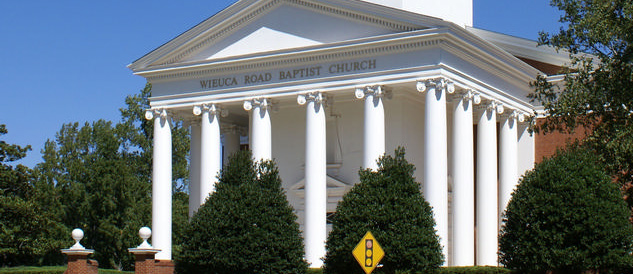Editor’s note: In 1984, the Southern Baptist Convention met in Kansas City for what was the sixth year of the so-called “conservative resurgence” that in time captured the leadership structure of the SBC and turned it rightward. The next year, 1985, would see 45,000 messengers descend upon Dallas for one of the most pivotal annual meetings in SBC history.
At the time, one of the leading voices of the moderate Baptist movement opposing the conservative political moves was Bill Self, pastor of Wieuca Road Baptist Church in Atlanta. Just six years later, Self would be one of the organizers of what became the Cooperative Baptist Fellowship, a breakaway group from the SBC.
What follows here is a transcript of a sermon Self preached at Wieuca on Sunday, June 24, 1984, right after the SBC annual meeting in Kansas City. Several things bear special note from this sermon, not the least being its profound relevance to the present moment. Also, what Self could not envision in 1984 — just as few leaders of the moderate Baptist movement could — is that by 1990 a schism would have occurred, with hundreds of churches leaving the SBC and hundreds more loosening their affiliations without joining a new group.
“I shall no longer ask myself if this or that is expedient but only if it is right. I do this because I need for myself a star that will not play false with me, a compass that will not lie.”
I quote from Alan Paton’s Cry the Beloved Country. I don’t care what’s expedient. I only care at this point what is right. This is a sermon I begged God not to let me preach but it is one I must.
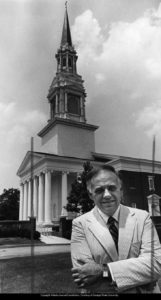
Bill Self with Wieuca sanctuary in background. (Photo courtesy of Georgia State University Digital Archives)
It started this week when I went to a retirement party for my dear friend, Dean Collins of St. Philips Cathedral. Dean Collins and I wouldn’t agree on very much, but we just agree that we love each other, we love the same Lord and we’ve had the joy of being together. When I was president of the Georgia Baptist Convention, I got to preach down there. In fact, I preached there several times. It is fun to put on all the flourishes and fly around and swing the incense pots every now and then — for a Baptist anyway! So it was a joy to go to a retirement luncheon that some businessmen had for him downtown.
I love to drop names, and when I’m in a place like that I want you to know I was in really fine company. The thing I like about Episcopalians is that they’re like the Baptist preacher who quit preaching and started selling bootleg whiskey. Someone asked, “How do you like your new job?” He said, “Well, there’s a lot more money in it and you work with a better class of people!”
So I was in a high crowd of people down there — a lot more money in it and a better class of people. We had three university presidents there. We had two bishops. You know, getting a Baptist preacher sitting next to a bishop was a lot of fun. There were one or two clergymen — two of us who were Baptists — and four or five presidents and chairmen of boards of major corporations.
There were about 30 in the room altogether, and as soon as I came into the room they all turned to me and said, “Bill, what’s happened to Southern Baptists?” Jim Laney from Emory, Manning Pattillo from Oglethorpe, Hugh Gloster from Morehouse — they were all talking to me about this, and I found myself wanting to wear a sign around my neck saying, “We’re not all that way. There’s another story. Listen.”
“They all turned to me and said, ‘Bill, what’s happened to Southern Baptists?’”
And then as I left on the elevator two hours later, going down to get into my car to leave, I thought to myself, “It’s time that some of us said some things that need to be said.”
Because of what has happened to Southern Baptists, I feel I must speak. We have been embarrassed by our national body.
In 587 B.C. the Babylonians came over the Jordan River into what is now Israel and sacked the city of Jerusalem and took 27,000 people into bondage. This became known as the Babylonian captivity of Israel. It lasted about 50 years and was a tortured tune for Israel.
In 1979, the modern Babylonians captured the Southern Baptist Convention in the city of Houston in the first politicized election we have ever had. Some of us who were there said it should not have been. Others said it would pass because in Southern Baptist life we have a unique kind of polity — church government — that is essentially built on trust.
I think it’s time for us to understand that in this captivity our heritage has been lost. We must reclaim our heritage and our land.
I have been involved, to some degree, in the tortured battle to save the Southern Baptist Convention for at least five years. You will remember (and I say this because it shows you how deep this matter is to me) my father died before I was a year old. I was raised in Baptist churches. I was educated in two Baptist institutions, and this Baptist institution paid for my education as I did my doctor’s degree at Emory. There I found I had not been shortchanged by Baptist institutions.
I owe my life to Baptists. Baptists are my family. My family consists of those who live with me at 609 Old Ivy Road and the family of Baptists. I think if I know anything, I know something about Baptists.
“When you hear anybody say, ‘the Baptist Church,’ meaning the larger body, it indicates they don’t understand us.”
How and why has this happened? First of all, you must understand the dynamic of Baptist life. I tease my dear friend, Frank Harrington, over at Peachtree Presbyterian Church. He’s always talking about the Presbyterian Church, and he asks me about the Southern Baptist Church, and I say, “No, Frank. It’s not the Southern Baptist Church.” You have Southern Baptist individual churches that cooperate together in an organization called a convention. We do not have a church. When you hear anybody say, “the Baptist Church,” meaning the larger body, it indicates they don’t understand us. That’s just a group of people cooperating together to do mission work.
We have individual churches. So we have the Wieuca Road Baptist Church cooperating with churches in the Georgia Baptist Convention and also in the Atlanta Baptist Association, and then we have the Wieuca Road Baptist Church cooperating at the national level with 30,000 other churches to do mission work.
We have fought, we have bled, we have worked, some have died to make sure the local autonomy, the freedom of the local church, and the freedom of the individual stays intact.
That means we are a rather elastic organization. When we meet, we work under certain house rules and we work under a great, great atmosphere of trust. There has always been a little pushing and shoving, but there has never been anything like this before.
Our family of faith is conservative by nature — I’ll talk about these categories in a moment — and we are diverse. We are as diverse as the Little Hope Baptist Church in the Forgotten Association that has a decimal point in front of the ZIP Code, or some large urban church. We are as diverse as California is diverse from the South Georgia swamps.
But thank God we’ve come together and we have put 6,000 missionaries on the field. We have six of the finest seminaries in the world. ‘Twenty percent of all seminarians are in Southern Baptist seminaries. They are fine, first-rate educational institutions. A student going to any of the six Southern Baptist seminaries does not ever have to fear about getting a second-rate theological education. We have done the job there. We have a $150 million annual budget in the Cooperative Program.
I could spend the time talking about how strong we are but this elastic, strange organization has become the second largest religious group in America — second only to Roman Catholics.
“You need to know something about our history. You need to know something about how we got the way we are.”
You need to know something about our history. You need to know something about how we got the way we are. I want you to go back with me in history — back to the days of “yesteryear.” Come for a moment, will you, to Dallas, Texas, and Fort Worth, Texas.
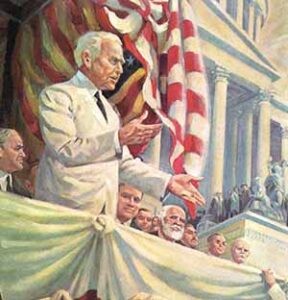
Edwin Hearne’s painting of George W. Truett delivering his 1920 address “Baptists and Religious Liberty” is part of the Eight Great Moments in Baptist History series. (SBHLA Image)
I want you to see two pastors — one by the name of Dr. George W. Truett, a man who has been known throughout the world as one of the great preachers in Christian history. He was the pastor of First Baptist Church of Dallas for 44 years. He died in 1942. He became the symbol of cooperative Baptist work. He began as a fundraiser for Baylor University. They called him to that church when he was a young man and, because of his magnanimous, loving spirit and his great pulpit work, he was able, due to his influence, to mold the Baptists.
He was president of the Southern Baptist Convention and later became president of the Baptist World Alliance. In 1920 he stood on the steps of the Capitol in Washington, D.C., and made the great religious liberty speech which became the definitive word on religious liberty in America.
Over in Fort Worth there was another man by the name of Frank Norris. What I say about Frank Norris I received from the Encyclopedia of Southern Baptists, so I’m not giving you opinion; I’m giving to you that which has been written in our basic encyclopedia.
Frank Norris had an entirely opposite spirit. Incidentally, Dr. Truett was born in North Carolina and moved to Texas and Dr. Norris was born in Alabama and moved to Texas.
“Frank Norris became contentious, argumentative, anticonvention.”
Frank Norris became contentious, argumentative, anti-convention. In the 75 Million Campaign, which most of you don’t know but it was the forerunner to the Cooperative Program, his church accepted a goal and then he refused to raise the money and complained about the program the whole time. He became so contentious and anti-convention that the 1922 Association of Baptists in Fort Worth excluded him. Later they tried to exclude him from the Texas Baptist Convention but they tabled the motion, never to take it off the table again.
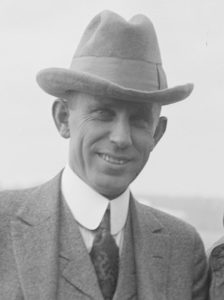
J. Frank Norris
Dr. Norris was tried in Texas courts for arson, for burning down his own church. He lost a thousand members out of his church because of his contentiousness. He was acquitted on the arson charge, then later he shot a man in his study and was acquitted for that. He had a very colorful career and he spent his life fighting Dr. George Truett.
There was one event in the life of Dr. Truett that caused him grief over all of his life. Dr. Truett was hunting, the gun misfired, it hit the leg of the police chief with whom he was hunting and the police chief was taken to the hospital. Later he died of a heart attack — not the wound in the leg. Dr. Truett grieved over that all of his life. In his church, even the widow of the police chief supported Dr. Truett through these days and it became a turning point, a deepening point, in his own life.
This little story I’m about to tell you I have not researched. It is an apocryphal story. Dr. Truett never got up to preach that he did not receive a telegram from Frank Norris reminding him of that accident when he was hunting. That shows you the difference in the two men.
Ultimately Frank Norris, who died in 1952, left Southern Baptist life and formed the Bible Fundamentalist Baptists. He died in 1952 but the sons, the spiritual sons, of Frank Norris have come back.
“The spiritual sons of Frank Norris have returned, and they are battling the spiritual sons of George Truett right now for the heart and soul of the Southern Baptist Convention.”
The spiritual sons of Frank Norris have returned, and they are battling the spiritual sons of George Truett right now for the heart and soul of the Southern Baptist Convention. This is what you need to understand. This is an old battle. It’s an old root but the battle has changed. The territory has changed but the battle goes on.
What difference does it make? Well, there are two or three things you need to know. We have now, since 1979, elected leaders of the Southern Baptist Convention that do not support the Southern Baptist Convention. We bought the bus. Now they’re driving it. They don’t even let us ride on the bus any more.
We have elected leaders whose Cooperative Program giving is very, very poor. This church has always given in the 10% to 12% range, sometimes 15%. It will vary a point or two a year, but it has been a high Cooperative Program giving church through the years. Those who have been leading the convention since 1979 vary from one and one-half to 3% of their undesignated gifts going to the Cooperative Program, the rest going to all kinds of things, which may or may not be good, but they cannot be counted as Southern Baptist mission opportunities.
What has that done? Well, first of all, now that they have been in power for five years and have slowly eroded away the Truett types on our boards and agencies, we have had a change. Remember, somebody discovered that if you control the presidency, you control the Committee on Committees, which controls the Committee on Boards, which controls all the boards. In a process of years, the whole ownership of this multi-billion-dollar denomination can be changed.
“It’s easier to hijack a denomination than it is to build your own.”
It’s easier to hijack a denomination than it is to build your own. That’s what the sons of Frank Norris have learned. So, what has happened in the meantime is that we have had boards and agencies controlled by people who do (not) feel a commitment to our past or our mission.
My wife serves on the board of Golden Gate Theological Seminary. A man from California was elected to the board whose Cooperative Program gifts are 0.8 of 1%. In the last board meeting they were informed that because of the $6 million to $8 million dollar national Cooperative Program shortfall, no professor at Golden Gate will receive a cost of living raise for this next academic year. The board was asked to make up the difference. That is happening all across the convention because those who are now driving the bus didn’t pay for it and somehow thought the money would continue to come in once they took over.
The president of Southeastern at Wake Forest, Randall Lolley, told me they have it on record that a professor will speak in the morning in class and three hours later he will get a call from Dallas. Some student has already reported and they call back saying, “We understand you said these things in class today. This goes in your file for the day of the purge.” That is not rumor. That’s happening. We’re coming to the place where there will be a purging.
“We’re coming to the place where there will be a purging.”
Now, what does this mean? What effect does it have? There is a creeping creedalism coming. This means we are coming to the place where there is going to be a Baptist creed. Our former president, Jimmy Carter, wrote a book calling for some authority, wanting a creed imposed on Baptists. That’s as foreign to us as it could be. You cannot imagine Baptists with a creed.
If you’re going to have liberty of conscience, a creed won’t do. A creed is too small to hold anybody’s conscience. The tragedy of the creed we’re being given is that it is a political creed. It’s a political agenda that is being brought to the life of the churches. Whether or not you cooperate or don’t cooperate depends not on the faith of your heart but the politics of your head. That bothers me.
I like the political times around here. You can go to the parking lot and see every candidate’s bumper sticker out there. I thank God for it. I really do. You can have diversity of political opinion and still be in church. Let’s not make what you believe politically become the creed for what you are spiritually.
“Let’s not make what you believe politically become the creed for what you are spiritually.”
What you believe about women and the women’s political agenda has now become a spiritual matter. I want to apologize to every woman in this church for what the Southern Baptist Convention did this year. I personally apologize to you. I disagree with it. It’s wrong.
Some have said, “Oh, we’ve repealed the 20th century.” Well, that’s tragic to go back to the 19th century. If we’re going to repeal the 20th century, let’s go back to the first century. I do not want to stop at the 19th with all of its prejudices. I want to go on back to the first century and the formation of the church.
What are we saying to the young ladies in our churches? We are saying to the young ladies in our churches that you can hear the Bible taught and preached, you can hear about the call of God to your life in our churches. You can answer the call for vocational Christian service in our churches. You can go to our seminaries and get a theological degree (not a lesser degree for women, but a theological degree just like your pastor has), then when you graduate you cannot serve because you’re a woman. That doesn’t make sense to me. We are either wasting a lot of money or messing up a lot of people, one or the other. I think it is wrong. I think it is immoral.
I have always felt, read and sensed the heartbeat of the New Testament to be that under the cross the ground is level. It is not high for rich and low for poor.
Under the cross the ground is level. What did Paul say in Galatians 3: 28? He said there is no distinction, including male and female, Greek or Barbarian — they’re all gone. At the foot of the cross there is level ground. It is not higher for whites than it is for Blacks.
“At the foot of the cross there is level ground. It is not higher for whites than it is for Blacks.”
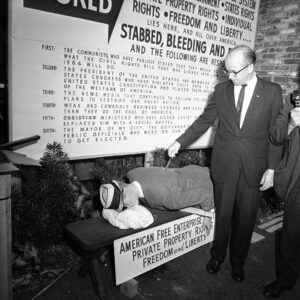
Lester Maddox puts a knife in the back of a life size manikin after he opened his restaurant in Atlanta, August 11, 1964. Maddox, under federal court order to serve Blacks, said his action represents what has happened to the American free enterprise system. “It has been stabbed in the back,” Maddox said as he refused again to comply with the court order. (AP Photo)
I came here in 1964. Lester Maddox was doing his thing downtown and the city was in turmoil. We knew together that God intended for the gospel to be for all people. Graciously, lovingly you moved into that. I am always happy to know that we have Blacks that are members of our congregation.
The gospel is for everybody. It is not set aside for lifestyle — whether you’re a nuclear family or whether you happen to be in a broken home or single. Our singles do not have to go into a room that says “single again,” which is like putting a tag on them. You’re a human being under God. All of us have had disruptions in our lives and under God we work it out.
I thank God that he has given us rich and poor in this congregation. I know sometimes when we get together we don’t look like it but there are — would you actually believe — poor people in this church. I don’t believe in my heart the gospel says there is any difference because of your sex.
You have the right to disagree with me, but we’re both going to be wrong. You must decide how you are going to be wrong, and I’ve decided how I’m going to be wrong.
“I’ve planted my flag on the side of love, acceptance, forgiveness, kindness, patience and longsuffering.”
I’m operating from the light I see, from what I’ve been taught to believe about the Bible and its interpretation. I’m operating from that stance, and I’ve planted my flag on the side of love, acceptance, forgiveness, kindness, patience and long-suffering. I’ve planted my flag there and if I’m wrong, I can look at Jesus straight in the eye at the judgment and say, “I heard your message on love and I saw the nail-scarred hands.” If I’m going to be wrong, it’s going to be on that side.
I’m not going to be wrong on the side of putting people in categories and stair-stepping them and making one better than the other. I’m not going to be wrong by having some kind of military pyramid over here and telling our young ladies that they cannot hear the call of God.
Now, let’s talk a minute about the Bible. I don’t like the fact that some people say they own the Bible and some people don’t. I have always thought that if you’re “steadfast, unmovable, always abounding in the work of the Lord” or “a tree planted by the rivers of water” that you just go on through that criticism and that chaff would fall away.
I am not going to get into a contest over who loves the Bible more. I love the Bible enough that I’ll spend 11 years beyond high school in academic preparation to interpret it. And I love the Bible enough that I will not come to this pulpit without spending the time getting my heart and mind right in order to say what it says as best I can. I love the Bible enough not to use it as a fetish but to hear the voice of God from it.
As best I can when I preach the Bible to you, I will never use it in an expedient way. Thank God, he has given us the freedom as Baptists to plant our lives upon it and to grow from it. He speaks to us through it. A lot of people who are talking about the Bible don’t spend much time reading it. A lot of sermons that are supposed to be biblical sermons aren’t biblical sermons. I love the Bible too much to make it a travesty in this house of worship.
I want to say something about conservative and liberal labels. I hate labels with a passion. I hate the label “single again.” I hate the label “black/white.” I hate the label “rich/poor.” If we’re going to use labels, we’ re going to use them correctly.
You know what “liberal” means? Liberal means the root of the past has been cut away. It’s liberal to go into your yard and pick up a tree and cut that root off. That’s liberal. When you do that, you do away with the past.
Do you know what “conservative” means? You take the past, conserve the best out of the past and you grow from that.
Using these definitions, this church is a mainline Southern Baptist church. We are a conservative church because we are building onto the foundation and root of George Truett. We are building on the background of Louie Newton. We are building on the great foundation of Beecher Hills Church and the Gordon Street Church and the Second Ponce de Leon Church and the Druid Hills Church. We are not going to Lynchburg, Va., to find out what our political agenda ought to be. We’re staying mainline Southern Baptist all the way.
“If the convention splits (which it won’t), when it settles down, whatever is Southern Baptist, we’re going to be in it and they are going to have to contend with whatever we are.”
Now, what does it mean? Remember the exiles? The Psalmist said, “How can we sing the Lord’s song in a strange land?” Here’s what I would suggest we do. We’re going to stay Southern Baptist. If the convention splits (which it won’t), when it settles down, whatever is Southern Baptist, we’re going to be in it and they are going to have to contend with whatever we are. When we’re giving $250,000 a year, they listen to us.
Now more than ever before, we have to worship with integrity. We’ll worship; worship will be fun; worship will have joy, but it will be on the historic root of free church worship and not take its cue from any kind of slick television worship.
I am going to continue to preach with integrity. I am not going to try to out-preach anybody but I’m going to try to give it to you straight from my heart and from the Scriptures.
We will do evangelism with honor. We will count one baptism one time. Some churches that baptize thousands of people are baptizing people over and over and over again. I told somebody that we have had some neurotics in this church, but they knew if I would do it, we could baptize them every week. With two of them that would give us 104 more baptisms every year. You see what I’m saying to you? Let’s do it with integrity and let the rest of them march where they want to. We’re staying in the family.
I had what psychologists call a right and left brain experience at the convention. I didn’t lose my mind, but I had a right and left brain experience. The right side of the brain is where our visualization comes from. The left side is our practical side. I don’t have much left side.
“In my mind and heart I could feel the tears from our forebears coming down upon that convention because we have been captured by the sons of Frank Norris.”
I’ve done this at conventions before. When the convention votes on something, I would look at the battlement of heaven around the convention and I would see old Charles Spurgeon up there. Remember, he would not preach in the United States because of his anti-slavery position. I would look up there and I’d see L.R. Scarborough who was the great evangelist preacher, a Baptist statesman of Texas. I would look at Sydnor Stealy, who was the president of my seminary. His spirit got into me somehow more than he will ever know.
There was George Truett. I’d see old Dr. Truett smiling over the convention. But this year I looked up after the stacked political shenanigans that would make the Democratic National Convention look like an afternoon prayer meeting. I looked into the balcony and there was Spurgeon; there was Scarborough; there was Stealy; and there were tears in their eyes. And in my mind and heart I could feel the tears from our forebears coming down upon that convention because we have been captured by the sons of Frank Norris.
There is a better day coming. We will sing the Lord’s song in a strange land. But we will never ask ourselves if this or that is expedient — only if it’s right. If the trumpet gives an uncertain sound, who shall prepare for the battle?
The transcript of this sermon was made available to BNG from the archives of The Church at Wieuca.
For a fuller treatment of the history of rivalry between J. Frank Norris and George W. Truett, see In the Name of God: The Colliding Lives, Legends, and Legacies of J. Frank Norris and George W. Truett by O.S. Hawkins.
Related articles:

